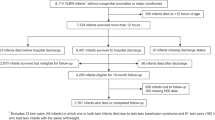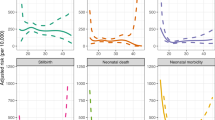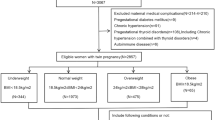Abstract
Objective:
To assess neonatal outcomes according to gestational weight gain (GWG) in twins.
Study Design:
This was a retrospective cohort study of twins delivered at ⩾24 weeks. GWG was defined using the Institute of Medicine (IOM) guidelines as the referent. Birthweight and neonatal intensive-care unit (NICU) admissions were compared with ≥2- and analysis of variance tests, stratified by body mass index (BMI).
Result:
In all three BMI groups, mean birth weight of the larger and smaller twin increased as GWG increased, P<0.01. For the underweight/normal-weight group, both twins <2500 g, <1500 g and small for gestational age decreased significantly as GWG increased. Birthweight <2500 g increased in all groups with GWG below the IOM guidelines, P<0.01. In the multivariate analysis, both twins <2500 g were significantly decreased with GWG above IOM guidelines. There was no difference in NICU admissions with GWG above the IOM guidelines.
Conclusion:
GWG above the IOM guidelines may improve twin birth weights, with the findings most significant in underweight/normal-weight women.
This is a preview of subscription content, access via your institution
Access options
Subscribe to this journal
Receive 12 print issues and online access
$259.00 per year
only $21.58 per issue
Buy this article
- Purchase on Springer Link
- Instant access to full article PDF
Prices may be subject to local taxes which are calculated during checkout
Similar content being viewed by others
References
Rasmussen K, Yaktine A . Weight Gain During Pregnancy: Reexamining the Guidelines. The National Academies: Washington, DC, USA, 2009.
Neggers Y, Goldenberg RL . Some thoughts on body mass index, micronutrient intakes and pregnancy outcome. J Nutr 2003; 133: 1737 S–1740.
Luke B . What is the influence of maternal weight gain on the fetal growth of twins? Clin Obstet Gynecol 1998; 41: 56–64.
Luke B, Keith LG . The contribution of singletons, twins and triplets to low birth weight, infant mortality and handicap in the United States. J Reprod Med 1992; 37: 661–666.
Martin JA, Hamilton BE, Sutton PD, Ventura SJ, Menacker F, Kirmeyer S . Births: final data for 2004. Natl Vital Stat Rep 2006; 55: 1–101.
Kogan MD, Alexander GR, Kotelchuck M, MacDorman MF, Buekens P, Martin JA et al. Trends in twin birth outcomes and prenatal care utilization in the United States, 1981-1997. JAMA 2000; 284: 335–341.
Fox NS, Rebarber A, Roman AS, Klauser CK, Peress D, Saltzman DH . Weight gain in twin pregnancies and adverse outcomes: examining the 2009 Institute of Medicine guidelines. Obstet Gynecol 2010; 116: 100–106.
Fox NS, Saltzman DH, Kurtz H, Rebarber A . Excessive weight gain in term twin pregnancies: examining the 2009 Institute of Medicine definitions. Obstet Gynecol 2011; 118: 1000–1004.
González-Quintero VH, Kathiresan AS, Tudela FJ, Rhea D, Desch C, Istwan N . The association of gestational weight gain per institute of medicine guidelines and prepregnancy body mass index on outcomes of twin pregnancies. Am J Perinatol 2012; 29: 435–440.
Zhang J, Landy HJ, Branch DW, Burkman R, Haberman S, Gregory KD et al. Contemporary patterns of spontaneous labor with normal neonatal outcomes. Obstet Gynecol 2010; 116: 1281–1287.
Zhang J, Troendle J, Reddy UM et al. Contemporary cesarean delivery practice in the United States. Am J Obstet Gynecol 2010; 203: e1–326 e10.
Yeh J, Shelton JA . Association of pre-pregnancy maternal body mass and maternal weight gain to newborn outcomes in twin pregnancies. Acta Obstet Gynecol Scand 2007; 86: 1051–1057.
Luke B, Leurgans S . Maternal weight gains in ideal twin outcomes. J Am Diet Assoc. 1996; 96: 178–181.
Colletto G, Segre C . Lack of effect of maternal body mass index on anthropometric characterisitics of newborns in twin gestations. Genet Mol Res 2005; 4: 47–54.
Simões T, Cordeiro A, Júlio C, Reis J, Dias E, Blickstein I . Perinatal outcome and change in body mass index in mothers of dichorionic twins: a longitudinal cohort study. Twin Res Hum Genet 2008; 11: 219–223.
Shamshirsaz AA, Haeri S, Ravangard SF, Sangi-Haghpeykar H, Gandhi M, Ozhand A et al. Perinatal outcomes based on the institute of medicine guidelines for weight gain in twin pregnancies. J Matern Fetal Neonatal Med 2014; 27: 552–566.
Hutcheon JA, Bodnar LM, Joseph KS, Abrams B, Simhan HN, Platt RW . The bias in current measures of gestational weight gain. Paediatr Perinat Epidemiol 2012; 26: 109–116.
Saldana TM, Siega-Riz AM, Adair LS, Suchindran C . The relationship between pregnancy weight gain and glucose tolerance status among black and white women in central North Carolina. Am J Obstet Gynecol 2006; 195: 1629–1635.
Cedergren M . Effects of gestational weight gain and body mass index on obstetric outcome in Sweden. Int J Gynaecol Obstet 2006; 93: 269–274.
DeVader SR, Neeley HL, Myles TD, Leet TL . Evaluation of gestational weight gain guidelines for women with normal prepregnancy body mass index. Obstet Gynecol 2007; 110: 745–751.
Kiel DW, Dodson EA, Artal R, Boehmer TK, Leet TL . Gestation weight gain and pregnancy outcomes in obese women: How much is enough? Obstet Gynecol 2007; 110: 752–758.
Acknowledgements
The data included in this paper were obtained from the Consortium on Safe Labor, which was supported by the Intramural Research Program of the Eunice Kennedy Shriver National Institute of Child Health and Human Development, National Institutes of Health, through Contract No. HHSN267200603425C. Institutions involved in the Consortium include, in alphabetical order: Baystate Medical Center, Springfield, MA, USA, ; Cedars-Sinai Medical Center Burnes Allen Research Center, Los Angeles, CA, USA; Christiana Care Health System, Newark, DE, USA; Georgetown University Hospital, MedStar Health, Washington, DC, USA; Indiana University Clarian Health, Indianapolis, IN, USA; Intermountain Healthcare and the University of Utah, Salt Lake City, UT, USA, USA; Maimonides Medical Center, Brooklyn, NY; MetroHealth Medical Center, Cleveland, OH, USA; Summa Health System, Akron City Hospital, Akron, OH, USA; The EMMES Corporation, Rockville, MD, USA (Data Coordinating Center); University of Illinois at Chicago, Chicago, IL, USA; University of Miami, Miami, FL, USA; and University of Texas Health Science Center at Houston, Houston, TX, USA. The named authors alone are responsible for the views expressed in this manuscript, which does not necessarily represent the decisions or the stated policy of the NICHD (National Institute of Child Health and Human Development). This study was supported by (1) the Intramural Research Program of the Eunice Kennedy Shriver NICHD, NIH (National Institutes of Health) (author MAK), through a contract (Contract No. HHSN267200603425C), (2) Grant Number K23 HD076010 from the NICHD and NIH (author MAK) and (3) the University of Illinois at Chicago (UIC) Center for Clinical and Translational Science (CCTS), Award Number UL1RR029879 from the National Center for Research Resources. The content is solely the responsibility of the authors and does not necessarily represent the official views of the National Institute of Health.
Author information
Authors and Affiliations
Corresponding author
Ethics declarations
Competing interests
The authors declare no conflict of interest.
Rights and permissions
About this article
Cite this article
Lal, A., Kominiarek, M. Weight gain in twin gestations: are the Institute of Medicine guidelines optimal for neonatal outcomes?. J Perinatol 35, 405–410 (2015). https://doi.org/10.1038/jp.2014.237
Received:
Revised:
Accepted:
Published:
Issue Date:
DOI: https://doi.org/10.1038/jp.2014.237
This article is cited by
-
Investigation of optimal gestational weight gain for twin pregnancy in Southwest China: a retrospective study
Scientific Reports (2023)
-
Association of provider advice and gestational weight gain in twin pregnancies: a cross-sectional electronic survey
BMC Pregnancy and Childbirth (2020)
-
Gestational weight gain charts for twin pregnancies in Southeast China
BMC Pregnancy and Childbirth (2020)
-
Why Pregnancy Weight Gain Guidelines Need to Differ for Multiple Versus Single Pregnancies
Current Nutrition Reports (2020)
-
The effect of gestational weight gain on perinatal outcomes among Chinese twin gestations based on Institute of Medicine guidelines
BMC Pregnancy and Childbirth (2019)



